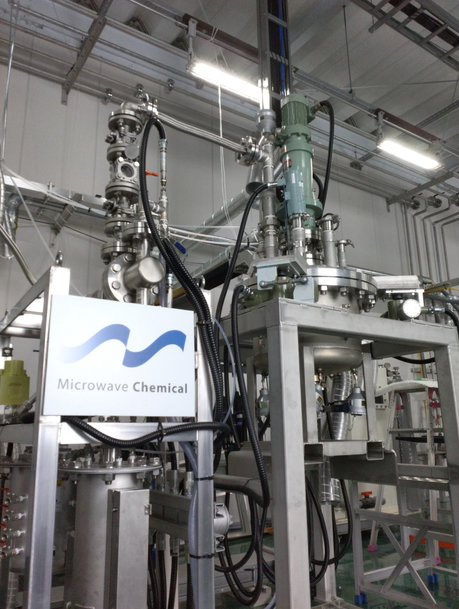www.industryemea.com
01
'23
Written on Modified on
Yokogawa Solution Service and Microwave Chemical Conclude a Joint Development Agreement
Yokogawa Solution Service Corporation announces the conclusion of an agreement with Microwave Chemical Co., Ltd. on the joint development of a small-scale distributed chemical recycling system that uses microwave heating.

The companies will aim to construct a small-scale, high-efficiency recycling system by combining Microwave Chemical’s high-efficiency plastic decomposition technology with an automation technology that is based on continuous control of the thermal decomposition process, an energy management system (EMS) for the utilization of renewable energy, and an electricity tracking system provided by Yokogawa Solution Service.
Collaboration Background
According to the Organization for Economic Cooperation and Development, the volume of discarded plastic produced globally in 2019 was 353 million tons, which is more than double the 156 million tons produced in 2000, and of this, only 9% is recycled*2. As such, further initiatives are required if a circular economy is to be achieved.
Chemical recycling, in which used resources are chemically processed and broken down at the molecular level to return them to the state of a raw material, is an excellent method that enables materials to be repeatedly recycled, even if they are not clean or contain impurities. When it comes to the chemical recycling of discarded plastic, the main subject of investigation by major chemical manufacturers and other such companies in Japan and overseas is large-scale centralized processing facilities with capacities of several thousand tons to tens of thousands of tons.
While these facilities can efficiently process large volumes of discarded plastic, the transport of these materials from remote locations is cost prohibitive and a source of CO2 emissions due to their low specific gravity and poor transportation efficiency per unit weight.
To address this issue, Yokogawa Solution Service and Microwave Chemical have concluded an agreement for the joint development of a small-scale distributed chemical recycling system to break down and process discarded plastic near where it is generated. This system has at its core a reactor that breaks down discarded plastic by using microwave heating, and it is used together with the aforementioned energy management system and electricity tracking system to reduce CO2 emissions.
Collaboration History
Microwave Chemical’s PlaWave chemical recycling technology uses microwaves to directly heat discarded plastic and thereby speed up the process of breaking down and processing these materials. This saves energy and is suitable for use on a small scale. With a focus on measurement, control, and information, Yokogawa Solution Service provides production control systems, instruments, and other solutions that achieve highly efficient and safe operations at all kinds of plants. Its solution for this application centers on an energy management system that can optimize operations by predicting energy demand.
Since August 2022, the two companies have been using a chemical recycling bench plant to investigate ways to improve yield, operating rate, and energy efficiency of a process involving the use of microwaves to thermally break down polyethylene (PE) and polypropylene (PP) and convert it into oil. They have verified the feasibility of this process and the methods for implementing it. On the basis of the results that were achieved, the companies concluded an agreement in September for the joint development of a small-scale distributed chemical recycling system.
Collaboration Details
Microwave Chemical will develop the core apparatus for the small-scale distributed chemical recycling system, and this will have built-in continuous thermal decomposition functionality for PE, PP, and PS (polystyrene). Yokogawa Solution Service will investigate measurement methods for monitoring the state of the thermal decomposition process and performing component analysis and estimation in real time. By making use of modeling technology developed by other companies in the Yokogawa Group, Yokogawa Solution Service will aim to automate the continuous control of the thermal decomposition process in this core apparatus, and thereby optimize this process.
To enable the carbon neutral recovery of resources by using renewable energy as the power source for this core apparatus, Yokogawa Solution Service will develop and provide an EMS and an electricity tracking system. Via the cloud, data from these systems on the operating status and state of this core apparatus will be continuously acquired and analyzed to make improvements and reduce maintenance costs.
The plan from FY2023 to FY2024 is to develop prototypes that incorporate input on user needs, and firm up functions and specifications. In FY2025, a commercial small-scale distributed chemical recycling system will be developed with the aim of commercialize this system the following year.
In parallel with the development of this small-scale distributed chemical recycling system, Yokogawa Solution Service and Microwave Chemical intend to form a consortium with retailers, chemical manufacturers, oil companies, and other organizations that are involved in processes ranging from the recovery and transport of discarded plastic to the refining, repolymerization, and distribution of recycled raw materials. By working together with all parties in this supply chain and sharing the use of facilities such as this cloud-based small-scale distributed chemical recycling system, the aim is to realize a carbon neutral society. The two companies will discuss the possible commercialization of this small-scale distributed chemical recycling system.
www.yokogawa.com

